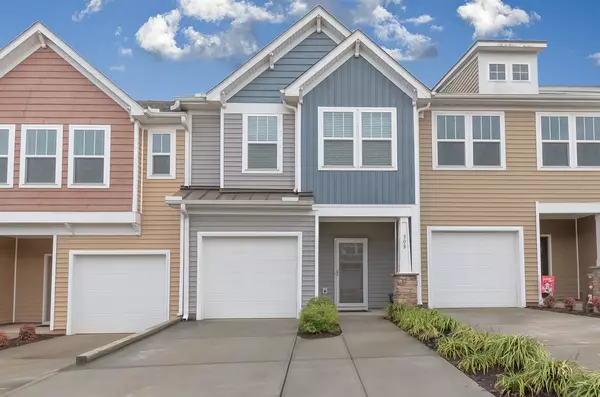
10 Real Estate Terms You Need to Know: Demystifying Your Home Buying or Selling Journey
10 Real Estate Terms You Need to Know: Demystifying Your Home Buying or Selling Journey Entering the world of real estate can be exciting, but also a little intimidating. With all the new terminology flying around, it's easy to feel lost. But fear not, home buyers and sellers! This blog cuts through the jargon and explains 10 key terms you'll encounter throughout the process: Buyer's Agent vs. Listing Agent: Think of these as your real estate guides. The buyer's agent works for you, the buyer, to find the perfect home and negotiate the best deal. The listing agent represents the seller, marketing the property and advocating for their interests. In some cases, a single agent might represent both parties (dual agency), but it's important to understand the potential conflicts involved. Pre-Approval Letter: Before you start house hunting, getting pre-approved for a mortgage is crucial. This letter from a lender verifies your financial situation and estimates how much you can borrow. It shows sellers you're a serious buyer and strengthens your offer. Closing Costs: Don't be surprised by hidden fees! Closing costs encompass various expenses like origination fees, title insurance, and property taxes. Factor these into your budget when calculating affordability. Contingency: This clause in a purchase agreement allows either party to back out under specific circumstances. Common contingencies include financing approval (if you can't secure a mortgage), home inspection results revealing major issues, or the seller's ability to sell their current home. Multiple Listing Service (MLS): This is a powerful tool for both buyers and sellers. The MLS is a giant database where real estate agents list properties for sale. This allows your home (if you're selling) to be seen by a wider audience, and lets buyers (if you're purchasing) search for properties across different brokerages. Earnest Money Deposit: This shows the seller you're serious about buying their home. It's a good faith deposit, typically 1-3% of the purchase price, that goes towards closing costs and becomes part of your down payment. However, you may get it back if a contingency is triggered. Appraisal: An unbiased professional assesses the property's market value. This is crucial because lenders typically won't loan more than the appraised value. If the appraisal comes in lower than the offer price, renegotiation might be necessary. Home Inspection: This is an investment worth making! A qualified inspector examines the home's structure, systems, and appliances, revealing any potential problems. This allows you to address concerns before finalizing the purchase. Closing: This is the final hurdle! At closing, all parties (buyer, seller, agents, and closing agent) come together to sign paperwork and finalize the sale. Ownership of the property officially transfers to the buyer. Homeowner's Association (HOA): If you're considering a planned community or condo, you'll likely encounter an HOA. This association sets rules and maintains common areas, often with associated fees. Understanding HOA regulations and fees is essential before buying. By grasping these real estate terms, you'll navigate the buying or selling process with more confidence. Remember, don't hesitate to ask your real estate agent for clarification on anything that remains unclear. Happy house hunting (or selling)!

Don't Let Blurry Photos Blur Your Chances: Why Pro Photography Sells Your Home Faster
Don't Let Blurry Photos Blur Your Chances: Why Pro Photography Sells Your Home Faster Professional photography is the CLEAR winner when it comes to selling your home! You've decluttered, staged, and your lawn is picture-perfect. Your home is ready to shine, but will it truly captivate buyers online? In today's digital world, high-quality photos are the key to unlocking buyer interest. Here's why investing in professional real estate photography is a smart move for any seller: 1. First Impressions Matter: Make Them Count Think of your listing photos as your home's online handshake. Crisp, well-lit images showcasing spacious rooms and inviting features are far more likely to grab attention than blurry phone snapshots. Professional photographers know how to capture the essence of your home, highlighting its best assets and creating a sense of warmth and livability. 2. Stand Out From the Crowd In a competitive market, every detail counts. Professional photos elevate your listing above the competition. With so many homes vying for buyer clicks, high-quality visuals will make yours stand out from the crowd. 3. More Clicks Mean More Interest Studies show that listings with professional photography receive significantly more clicks and inquiries. This translates to a wider pool of potential buyers, increasing your chances of finding the perfect match for your home. 4. Faster Sales and Potentially Higher Offers Professional photos can significantly accelerate the selling process. By sparking buyer interest and showcasing your home's value, you're more likely to receive offers quicker. In some cases, high-quality photography can even lead to higher offers, as buyers perceive the property in a more positive light. 5. Professionalism Makes a Difference Hiring a professional photographer demonstrates to potential buyers that you're serious about selling your home. It shows a commitment to quality and creates a perception of a well-maintained property. Beyond the Basics Professional photographers offer more than just great photos. They have the expertise to use techniques like wide-angle shots, HDR imaging, and virtual staging to truly showcase your home's potential. The Bottom Line Investing in professional photography is an investment in selling your home faster and potentially for more money. High-quality visuals create a positive first impression, generate more interest, and ultimately lead to a smoother selling experience. So, don't let blurry photos blur your chances of a successful sale. Ready to get started? Ask us for recommendations on reputable real estate photographers in your area.

Don't Let Your Home Rest on Uneven Ground: The Benefits of Crawl Space Encapsulation
Don't Let Your Home Rest on Uneven Ground: The Benefits of Crawl Space Encapsulation As homeowners, we take pride in our abodes. We want them to be comfortable, healthy, and efficient. But what about what lies beneath our feet? Many homes are built with full or partial crawl spaces – those often-forgotten areas that can have a big impact on the overall well-being of your house. Here's the truth: an exposed crawl space can be a breeding ground for trouble. Moisture, pests, and allergens can all thrive in this dark, damp environment. But there's a solution: crawl space encapsulation. Encapsulating Your Crawl Space: A Wise Investment Crawl space encapsulation is the process of sealing the crawl space from the elements. This is typically done by installing a vapor barrier on the floor and walls, and then adding insulation. The result? A dry, clean, and healthy space that benefits your home in several ways: Improved Energy Efficiency: An unsealed crawl space allows conditioned air to escape, forcing your HVAC system to work harder. Encapsulation keeps the warm air in during winter and the cool air in during summer, leading to lower energy bills. Enhanced Indoor Air Quality: Moisture in the crawl space can lead to mold growth, which can trigger allergies and respiratory problems. Encapsulation creates a healthier living environment for you and your family. Reduced Risk of Foundation Problems: Moisture can also wreak havoc on your foundation. Encapsulation helps prevent cracks and other damage, saving you money on costly repairs down the road. Increased Value: Homebuyers are increasingly looking for energy-efficient and healthy homes. Encapsulating your crawl space can be a selling point, potentially boosting your home's value. Is Encapsulation Right for You? If your home has a crawl space, encapsulation is definitely worth considering. Here are some signs that it might be especially beneficial: You notice musty odors in your home. You see signs of moisture damage, such as mold or mildew growth. You have high humidity levels in your home. You have frequent pest problems. Your energy bills are higher than expected. Taking the Next Step If you're interested in learning more about crawl space encapsulation, consult with a qualified foundation repair or crawl space specialist. They can assess your specific needs and provide you with a free quote. Remember, a healthy crawl space leads to a healthy home. Don't let your investment rest on shaky ground – consider crawl space encapsulation for a happier, healthier, and more valuable home.
Categories
Recent Posts










